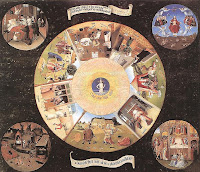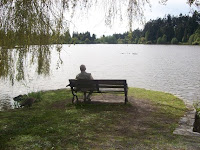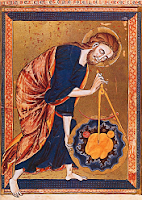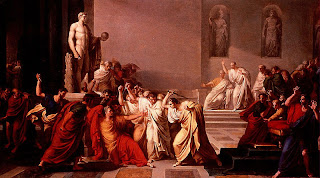One of the main tenets of gnosticism is that the Bible is misleading. This does not necessarily mean that the Bible is wrong, but rather that it has been twisted and contorted over the centuries. It has become a document that is purported to be drowning instead of upholding the original truth; its truth may reveal itself in a close study, yet only in the form of flecks or sparks according to the gnostic tradition.
The main premise is that the God represented in the Western tradition is not the ultimate or “real” God. He is, in fact, not even the most powerful, yet the most ambitious and – yes, you guessed it – the most jealous. This might explain the horrible acts that this god, or demiurge, commits, especially in the Old Testament. In other words, this god is seen as the spoiled child of the mother of god, known as Sophia, meaning in this case "eternal wisdom."
Does any of this make sense or is it simply heresy? One thing that strikes me despite my dislike and hesitance towards this interpretation is that it could somehow shed light on problems I have with certain events in the Bible. It might give me an answer to the problem of evil, Adam and Eve, problems with gender – at times in form of blatant misogyny - and the general non-acceptance of other religions.
First, let us start with Adam. He was in paradise with not much to do. The jealous god, or again demiurge, could not prevent that some of the “higher echelon” or “executive” gods put a tree of knowledge in this supposed paradise. So this god of the Bible decides to entertain Adam with various delights, including a beautiful woman made in his image. This would help lull Adam and prevent him from seeing and understanding the truth.
Now here is when the interpretation becomes twisted and why gnosticism is branded as "devil worship," or inversely why some followers of gnosticism accuse Christians to be following -unwillingly - the “evil one.” According to gnostic tradition, a senior god appears for the first – but not the last – time in this Bible, as a snake! He wants Adam and Eve to understand the truth and to see and think for themselves. In other words, he wants them to realize that the paradise they are living in is fake and so is their god for that matter.
And the snake does not address Adam, but Eve. She as a female is blessed with intuition and quickly believes the messenger. What is often supposed to be a “weakness” is reverted into strength. Eve later persuades Adam, and they both partake of the forbidden fruit of the tree of knowledge. And suddenly truth dawns upon them. They are as enlightened as a Buddha.
The jealous god finds out. He is furious. He wants to kill and destroy them. He curses them. He gives Eve, the instigator, a curse to haunt all women: labor. And he ejects both of them from paradise with the “gift” of suffering and death.
At various times the demiurge gets angry at humans and attempts to annihilate everyone in the process. The higher gods manage to save Noah from this god's wrath and, as such, humanity continues its existence. Then the jealous god comes up with specific rules claiming that he is the only one to be worshiped and that grave punishment waits for all those who do not. He talks of eternal damnation and induces fear in all people. He says believe only in me and do not have any other gods or idols; he does so lest they find out the truth the same way Adam and Eve have.
After eons of looting and destruction on earth, the executive gods send their own messenger to pave a new path. It is Jesus. He is the truth embodied and comes as a healthy counterbalance to the vengeful and even bloodthirsty god. He proclaims peace. He preaches acceptance. And he transmits secret knowledge to his apostles.
The jealous god has him crucified. But the popularity of Jesus has grown rapidly so instead of dismissing him as a heretic, he actually embraces him and calls him his son. If you can't fight them, join them! All this happened out of necessity, and it might explain the subsequent split of the Bible as it is suspended between violence and peace, vengeance and love.
What to make out of all this? If you disagree with it, it makes at least good fiction and an interesting hypothesis. It is a novel and different interpretation and gives food for thought. It can, at best, put things into perspective.
To me the forbidden tree parable offered by traditional sources leaves me rather confused. Why would God tempt people for no particular reason and why would be it a bad thing to have knowledge? Why would God seem so insecure and try to shield us from that? What does he have to hide?
At the same time, the gnostic hypothesis would explain the problem of evil. Evil exists then because the higher powers are in conflict, something that happened often in Greek and Roman mythology. There would be no all-powerful god controlling everything but rather a constant struggle for power.
This would also shed light on some of the excruciating violence in the Bible. Why nearly destroy the whole of the human race? Why is there such a huge difference between the Old and the New Testament in its depiction of God. Could we – or rather should we – choose only the aspects of the Bible that we respect most? Is the Bible to be taken literally, figuratively, seen as analogy, philosophy, literature, as the Word of God?
Although the issues that gnosticism raises about the Bible and God may have some appeal in a sort of devil's advocate manner, it does not mean that gnosticism is necessarily true. However, there is no doubt that historically many people in power have altered or changed the Bible and/or its interpretation for political or social motives.
Women had to take the brunt in most of this and “original sin” has been the proposed reason and justification for various “witch hunts” on the female species. At the same time, various parts and even gospels of the Bible have been suppressed or discredited over the years perhaps because they did not fit or benefit the ideology of those in power. There are many issues in organized religion that one ought to reflect upon and be wary about, and one should not simply and blindly accept everything as given truth. Now where is that tree of knowledge when you need it most!




















.svg.png)
